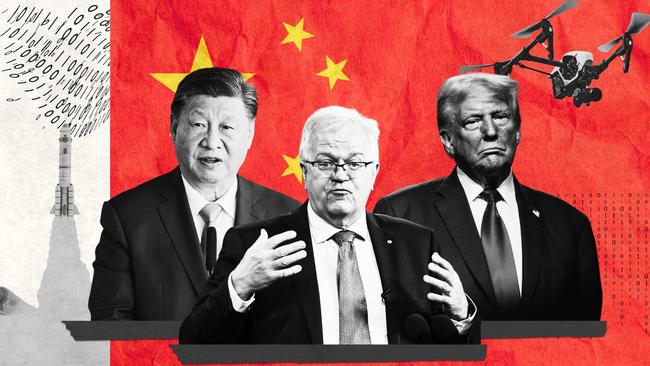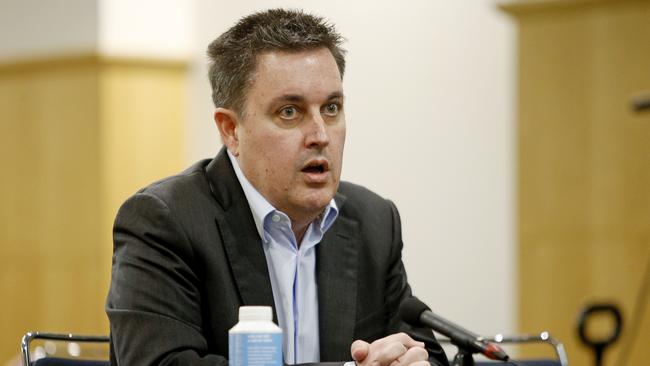Australia must ramp up research spending in an age of hi-tech warfare, Nobel laureate warns
Astrophysicist Brian Schmidt is scared — but Trump’s siege on US universities gives us a once-in-a-lifetime opportunity to level the field.

Nobel laureate Brian Schmidt has warned China is ramping up research spending as the US and Australia cut costs, despite the increasing risk of hi-tech warfare.
Professor Schmidt – a world-renowned astrophysicist and former vice-chancellor of the Australian National University – said Australia must not “stick its head in the sand’’ over the dangers of dwindling investment in sovereign research and development.
“We are now seeing how quickly the nature of conflict has evolved in the Russia-Ukraine war,’’ Professor Schmidt will tell the National Press Club in a keynote address on Wednesday.
“We can expect new technologies based around small-scale automated machines, hypersonic missiles and computer warfare to feature prominently if we are to have future conflicts between advanced economies.
“In such a case the research capability of a country will be incredibly important at influencing the overall winners and losers, because once the conflict starts, you ‘have what you got’.
“I hope we never get to this state, but nor should we stick our heads in the sand and ignore the possibility.’’
Professor Schmidt was awarded the Nobel Prize for physics in 2011 for discovering that the universe is expanding at an increasing rate.
He received his PhD in astronomy in 1993 from Harvard University, which is under attack from US President Donald Trump.
Mr Trump is trying to ban foreign students from attending the Ivy League university, and on Tuesday threatened to cancel $4.6bn of previously awarded grant money and give it to trade schools instead.
Professor Schmidt will tell the Press Club sovereign research capability has “enormous consequences for Australia’s future’’.
“I look around and I am scared,’’ he will say. “The Australian government investment in its sovereign research capability was 50 per cent higher 15 years ago as a fraction of GDP.
“In the US, our largest research partner, the university sector is under siege on multiple fronts, including the Trump administration proposing to immediately halve expenditure in the National Science Foundation and the National Institutes of Health – the bedrocks of US research.’’
Professor Schmidt will use his speech to “remind you what China is up to’’.
“They have raised their R&D spend by 8.3 per cent last year, having increased their R&D spend as a function of GDP by more than a factor of five in the time I have lived in Australia (since 1995),’’ he will say.
“I want you to think what their increase and our decrease means for Australia’s future economic and security environment.
“I find it a sobering thought.’’
Professor Schmidt will tell his audience that Germany had the world’s most advanced physics research capability in the 1920s and 1930s. “The Nazis drove away all of their Jewish scientists – who were a large fraction of German scientific endeavour – and treated the scientists who remained largely with contempt,’’ he will say.
“The refugee scientists took up residence largely in the UK and US, creating a technical ascendancy for the allies – whether it be in radar, bombsites, penicillin, code-breaking, or nuclear weapons – and was a major part of the ultimate defeat of the Nazi regime.’’

In a joint address to the Press Club, eminent economist Richard Holden – who is Scientia Professor of Economics at the University of NSW – will warn that “some of the world’s greatest universities are under attack’’.
He will call on the Albanese government to “stop dithering’’ and boost direct funding for university research by $1.2bn a year, which he described as a “rounding error’’ in the context of Australia’s $700bn federal budget.
“In a tumultuous global landscape, where we can no longer rely on our most important ally the way we have in the past, we must secure our sovereign research capability,’’ he will say.
“It’s essential for our economic and national security. Sovereign research capacity is built over decades, but can be lost in months – we must stop dithering.’’
Professor Holden has just returned from a week at Harvard, which he said had been stripped of funding “for having the temerity to resist the Trump administration’s push to intervene in their choices of faculty, students and their curriculum’’.
“Australia is not immune from the carnage in US higher education,’’ he will say. “The Australian Academy of Science estimates more than $300m of funding for research by Australian university researchers is already in jeopardy’’.
Professor Holden will challenge Australia to take advantage of Mr Trump’s destruction of the US research ecosystem.
“What is happening to US research and researchers is shocking,’’ he will say. “But this act of self-harm is our opportunity … (which) may never arise again.
“In coming months and years, many leading US researchers may be looking to move their labs, their families, and their lives abroad.”




To join the conversation, please log in. Don't have an account? Register
Join the conversation, you are commenting as Logout